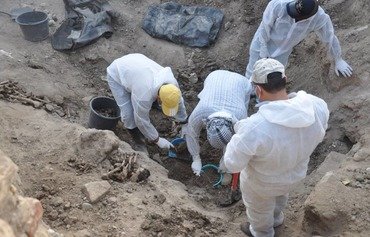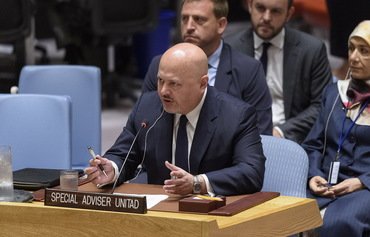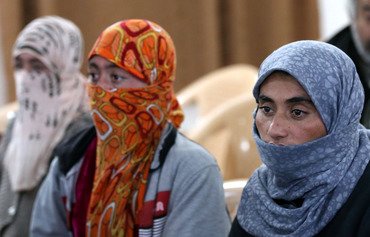Iraq's Independent High Commission for Human Rights last month announced it has documented at least 2,000 of the most serious crimes committed by the "Islamic State of Iraq and Syria" (ISIS).
This step precedes a visit from a UN team to Iraq, which will work with Iraqi experts to investigate these violations and gather further evidence.
The commission has documented more than 2,000 serious violations committed by ISIS elements during the group's three year rule in parts of Iraq, commissioner Fadel al-Gharawi told Diyaruna.
Major violations are categorized as genocide, crimes against humanity and war crimes, with sub-categorizations that include denial of the right to live, religious persecution, violence against women and children, forced displacement and terrorization, as well as robbery and vandalism of national heritage sites.
Among the most violent crimes committed by ISIS is the 2014 Camp Speicher massacre in which more than 1,700 Iraqi recruits were killed in cold blood, and hundreds of others were executed at Badush prison.
Other ISIS crimes include the abduction and enslavement of around 5,000 Yazidi women and children, and the mass murder of hundreds of Mosul residents.
"We had previously raised these and other crimes to the Iraqi parliament and government, and we requested that they be documented so they could be used as evidence to prosecute ISIS within Iraq and on an international level," he said.
Comprehensive documentation
The Independent High Commission for Human Rights is preparing to present comprehensive documentation of these crimes to the UN team, which is expected to arrive in Iraq at the beginning of July.
The team was formed pursuant to UN Security Council Resolution 2379 (2017), to support the Iraqi government's effort to hold ISIS elements accountable for their actions.
UNSCR 2379 calls for the establishment of an independent investigative team that will collect, preserve and store evidence of acts that may amount to war crimes, crimes against humanity and genocide committed by ISIS in Iraq.
"An Iraqi team will work alongside the UN team, which includes international investigators," al-Gharawi said.
Iraqi ministries and authorities already have started to select their representatives for the national team, he said, which will comprise investigative judges, forensic experts and specialists in international law.
"The UN team will stay in Iraq for two whole years," he said, where it will work with the Iraqi team to investigate ISIS crimes and gather witness testimonials and criminal evidence.
These will be used to issue convictions and international arrest warrants for perpetrators still on the run in order to prosecute them in international courts.
'Wounds have not yet healed'
Raising the crimes of ISIS to an international investigation process is “an important step”, said Anbar provincial council member Athal al-Fahdawi.
Anbar supports this international effort and is willing to co-operate with the UN and Iraqi teams charged with conducting investigations, he told Diyaruna.
"ISIS had resorted to eliminating members of tribes that were opposed to them in Anbar," he said, noting that its elements killed hundreds of Albu Nimr tribesmen.
ISIS elements deliberately set out to destroy the province's infrastructure, in addition to public and private property, he said.
“We fought the most dangerous terrorist group on the face of the earth," Ninawa provincial council security committee member Binyan al-Jarba told Diyaruna.
"Our wounds at the hands of this barbaric group have not yet healed," he said. "There is a massive level of destruction in our province, which has affected mosques, historical burial and archeological sites."
"Thousands of people are still unable to return to their destroyed homes while others are missing," al-Jarba said. "We hope the international community will now help us to criminalise these terrorists just as they helped us defeat them."

![Iraqi specialists exhume the remains of the victims of the Camp Speicher massacre, who were executed by the 'Islamic State of Iraq and Syria' in June 2014. [Photo courtesy of the Iraqi Martyrs Association]](/cnmi_di/images/2018/06/01/12776-Iraq-camp-Speicher-600_384.jpg)






